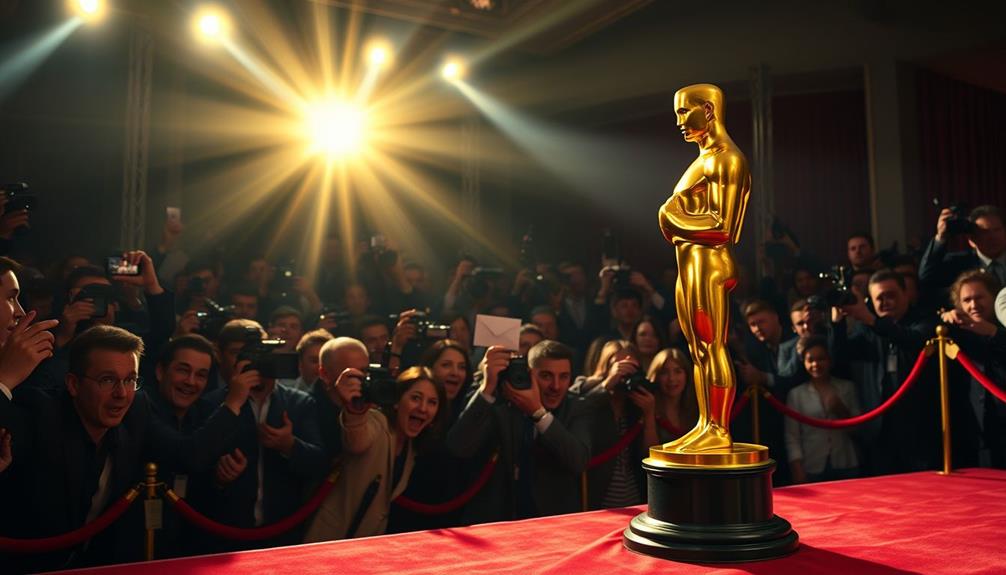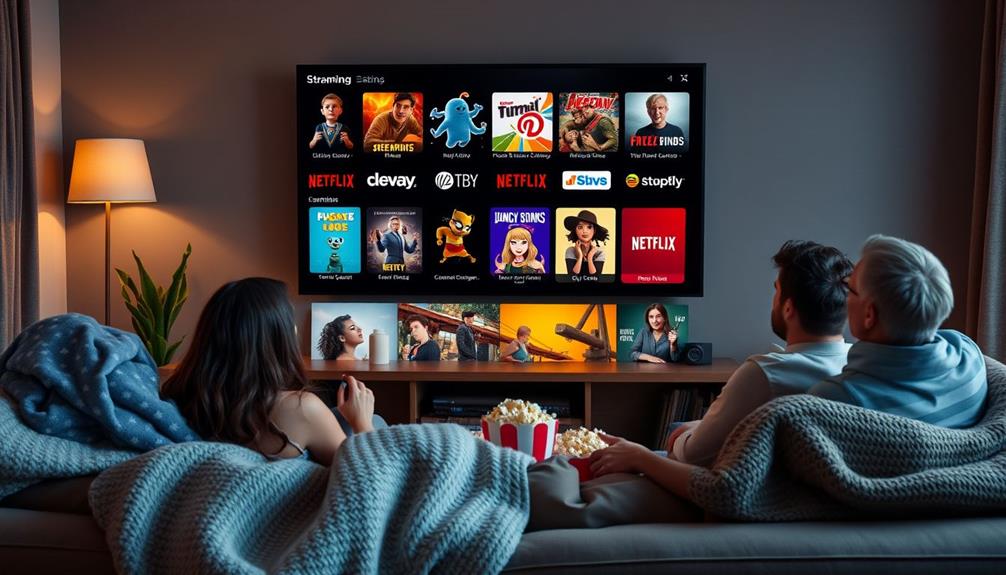You can't discuss the Oscars without mentioning their most controversial moments. From Marlon Brando declining his award to protest Native American treatment in 1973, to Michael Moore's bold political stance in 2003, these events have sparked major discussions. Will Smith's infamous slap of Chris Rock in 2022 added another layer of intrigue. Missteps, like the 2017 Best Picture announcement mix-up, showcased the Oscars' unpredictability. Controversial fashion choices and unconventional acceptance speeches further fuel debates about representation and social issues. Each incident not only ignited chatter but also challenged the film industry's norms and values. Explore these moments further to uncover their impact.
Key Takeaways
- Marlon Brando's 1973 Oscar rejection highlighted Native American issues, using Sacheen Littlefeather to protest systemic mistreatment.
- The 2017 Oscars mistakenly awarded "La La Land" as Best Picture instead of "Moonlight," showcasing a major blunder in the ceremony.
- Will Smith's slap of Chris Rock in 2022 over a joke ignited discussions on conduct and violence at public events.
- The #OscarsSoWhite movement in 2015 emphasized the lack of diversity in nominations, prompting industry-wide conversations about representation.
- Joaquin Phoenix's 2020 acceptance speech for animal rights challenged industry norms and sparked dialogue on ethical treatment in Hollywood.
Political Statements and Activism
Throughout Oscar history, moments of political statements and activism have often overshadowed the glitz and glamour of the awards.
Take Marlon Brando, for example. In 1973, he declined his Best Actor Oscar for "The Godfather" and sent Sacheen Littlefeather instead to protest the treatment of Native Americans in Hollywood. This bold move raised awareness of Indigenous issues in a powerful way, much like Jenna Elfman's recent interviews that discuss Hollywood impact and career evolution.
Fast forward to 2003, when Michael Moore used his acceptance speech for "Bowling for Columbine" to condemn the Iraq War and criticize then-President George W. Bush, making a significant political statement at the Oscars.
In 2016, Chris Rock tackled the #OscarsSoWhite controversy, using humor to address the lack of diversity in nominations and calling for change in Hollywood.
Then, in 2022, the incident involving Will Smith slapping Chris Rock over a joke about Jada Pinkett Smith ignited discussions about the boundaries of public conduct during award ceremonies.
These moments illustrate how the Oscars serve as a platform for activism and political statements, reminding you that beneath the surface of entertainment lies a vibrant discourse on social justice and representation.
Controversial Best Picture Winners
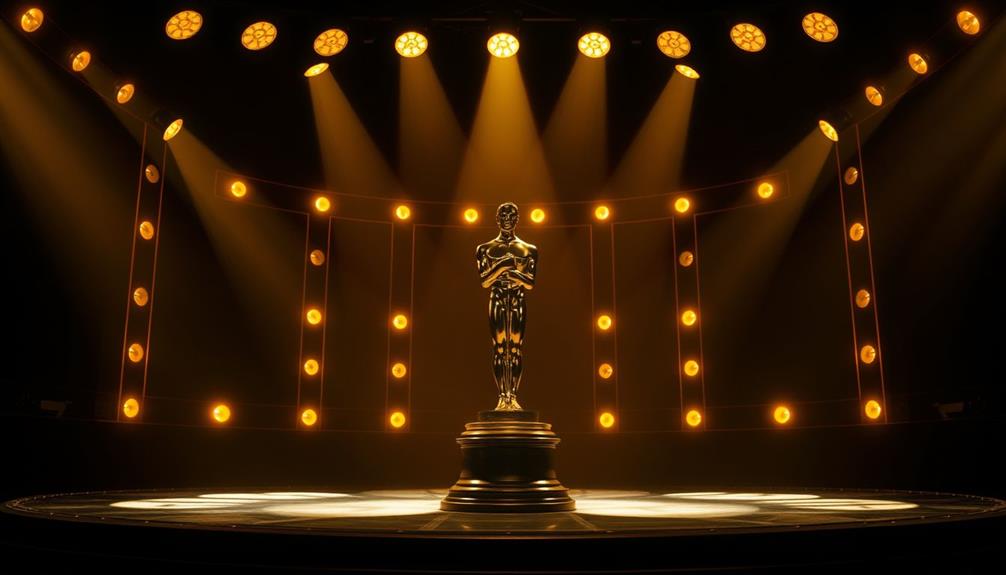
The Oscars have long been a stage for bold statements and discussions, but they've also sparked debates over the films that take home the coveted Best Picture award. Controversial moments in Oscar history often arise from unexpected winners, leading to heated conversations about what the Academy values.
For instance, the evolving dynamics of celebrity relationships often mirror the unexpected twists in Oscar outcomes, reflecting how public perception can shift dramatically. This is evident in how films like "Crash" (2006) were received, as critics labeled it one of the worst winners, claiming it triumphed due to the influence of homophobic backlash.
Here are three notable Best Picture winners that stirred controversy:
- "Crash" (2006): This film triumphed over "Brokeback Mountain," leading to claims of homophobic backlash influencing the voting, with critics labeling it one of the worst winners.
- "Green Book" (2019): While it won over "Roma," the film faced backlash for its historical inaccuracies and sparked discussions about Netflix's role in the Oscars.
- "Forrest Gump" (1995): This Best Picture winner overshadowed "Pulp Fiction," igniting debates about the Academy's preference for mainstream films over groundbreaking cinema.
Additionally, "Shakespeare in Love" (1999) upset "Saving Private Ryan," highlighting genre favoritism in Academy choices.
These moments reflect the ongoing tension between artistic merit and popular appeal, leaving many spectators questioning the true essence of a Best Picture winner.
Award Ceremony Mishaps
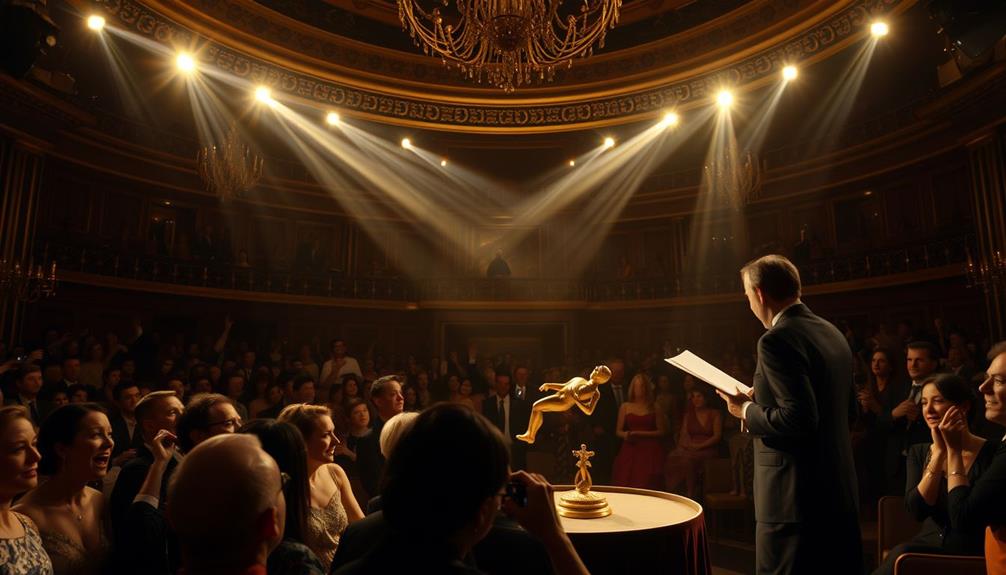
What happens when an award ceremony takes a turn for the unexpected? You witness moments that become etched in Oscar history for all the wrong reasons.
Just think about the 2017 Oscars, where Warren Beatty and Faye Dunaway infamously announced "La La Land" as Best Picture before realizing it was actually "Moonlight." That mix-up shocked everyone and left audiences buzzing. Such unpredictable events can sometimes feel like the unexpected twists in the narratives of the films themselves, reminiscent of the crazy games that create unforgettable memories.
Fast forward to 2022, when Will Smith delivered the jaw-dropping "Oscars slap" after Chris Rock made a joke about Jada Pinkett-Smith. The incident not only overshadowed the event but also led to Smith's 10-year ban from Academy events.
In 1989, the ceremony featured a musical number with Rob Lowe and Snow White that bombed spectacularly, leading to plummeting viewership.
You can't forget the 1974 Oscars when streaker Robert Opel dashed across the stage, prompting David Niven's iconic quip.
And who could overlook Adrien Brody's unexpected kiss on Halle Berry during his acceptance speech in 2003? Each of these mishaps reminds us that the Oscars can be as unpredictable as the films they celebrate.
Unconventional Acceptance Speeches
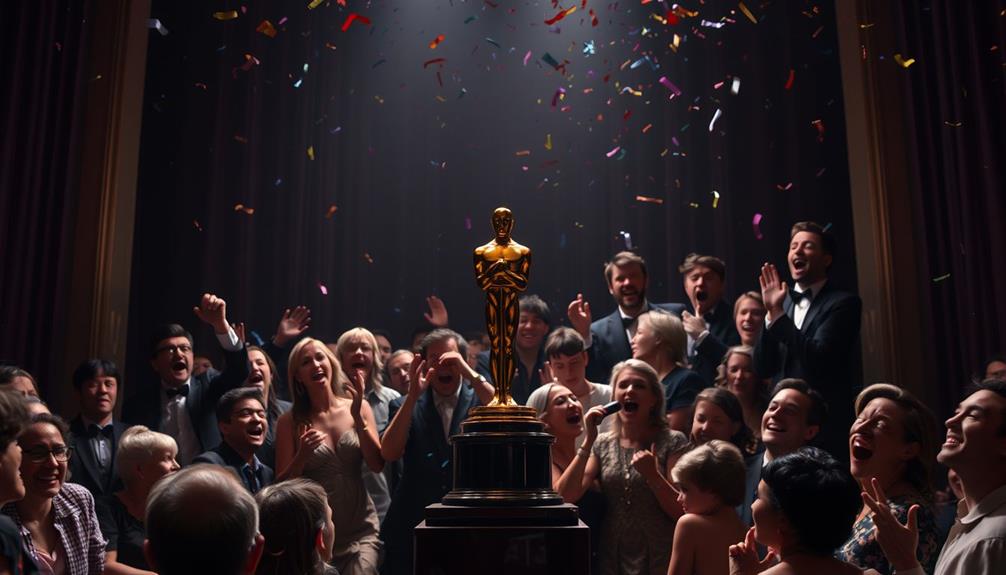
Unconventional acceptance speeches can transform a moment of triumph into an unforgettable spectacle at the Oscars. These moments often leave audiences buzzing long after the awards ceremony ends.
The influence of astrology on attractiveness can be seen in how some winners shine in the spotlight, enchanting viewers with their charm and presence. Here are three unforgettable examples:
- Angelina Jolie's kiss: When Jolie won Best Supporting Actress in 2000, she surprised everyone by kissing her brother James Haven on the lips, sparking controversy and media frenzy.
- Jack Palance's push-ups: In 1992, Palance won Best Supporting Actor and showcased his humor and strength by performing one-armed push-ups on stage, leaving the audience both entertained and impressed.
- Joaquin Phoenix's activism: During his 2020 acceptance speech for Best Actor, Phoenix passionately criticized animal exploitation, particularly the dairy industry, using his platform to advocate for change.
These unconventional acceptance speeches not only capture the spirit of the moment but also challenge norms, making them memorable.
From Michael Moore's bold political stance in 2003 for his documentary to Frances McDormand's introduction of the "inclusion rider" for Best Actress in 2018, these speeches continue to resonate with audiences and inspire dialogue.
Memorable Oscar Moments
Oscar ceremonies are often filled with unpredictable moments that become etched in memory long after the awards are handed out. One of the most relatable instances happened in 2013 when Jennifer Lawrence tripped on her way to accept her Best Actress award. This humorous moment resonated with viewers, showcasing her down-to-earth charm.
The Oscars also frequently highlight the intersection of film and cultural phenomena, much like how best anime movies have influenced global storytelling.
In Oscar history, few moments are as talked about as Adrien Brody's spontaneous kiss with Halle Berry during his acceptance speech for Best Actor in 2003. It caught everyone off guard and remains a memorable highlight.
Fast forward to 2015, and John Travolta created a buzz when he mispronounced Idina Menzel's name as "Adele Dazeem." This gaffe quickly turned into a viral meme, illustrating the unpredictability of live television.
Another unforgettable instance was Eminem's unexpected performance of "Lose Yourself" at the 2020 Oscars, which reminded audiences of the powerful connection between music and film.
Fashion Controversies
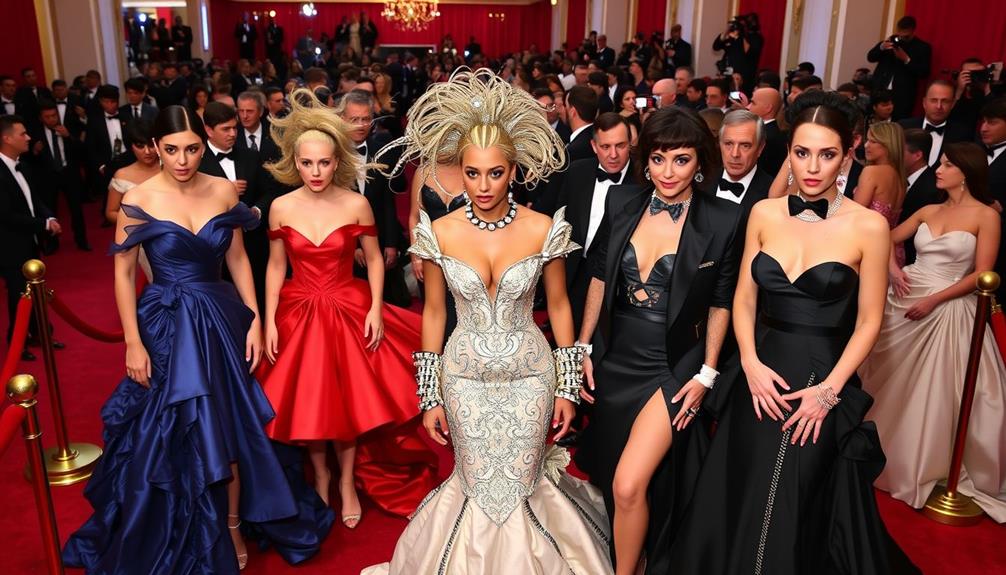
When you think of Oscar fashion controversies, Cher's bold outfits instantly come to mind. Her daring choices not only pushed the boundaries of red carpet attire but also sparked conversations about gender norms and body image, similar to how astrological compatibility affects romantic attraction.
Similarly, the provocative statements made by creators like Matt Stone and Trey Parker challenge Hollywood's traditional expectations, making you reconsider what fashion means in this glamorous world.
Cher's Bold Outfits
At the heart of fashion controversies in Hollywood, Cher stands out with her audacious choices that challenge the status quo. Her bold outfits at the Oscars have sparked significant dialogue about self-expression and the norms of black-tie attire.
In the sphere of motivational speaking, much like Cher's audacity in fashion, some speakers emphasize vulnerability and authenticity to connect with their audience.
Here are three standout moments that define her influence on red carpet fashion:
- 1986 Oscars: Cher made headlines with a daring black feather headpiece designed by Bob Mackie. This outfit was a striking deviation from conservative norms, igniting both admiration and criticism.
- 1988 Oscars: Cher returned in a sheer, sequined ensemble that further solidified her reputation as a fashion risk-taker. The media couldn't help but spotlight her as she captured the audience's attention.
- Cultural Impact: Cher's choices encouraged discussions around gender norms and self-expression within the formal setting of the Oscars. Her bold fashion statements have left a lasting impact, influencing trends and inspiring future stars to embrace their individuality on the red carpet.
With each appearance, Cher not only showcased her unique style but also redefined what it means to make a statement in Hollywood.
Provocative Red Carpet Statements
Provocative fashion choices on the red carpet often ignite spirited debates about artistic expression and societal norms. Cher's bold black feather outfit at the 1986 Oscars shattered traditional black-tie expectations, garnering massive media attention.
Two years later, she returned in a daring sequined and sheer ensemble, solidifying her status as a fashion risk-taker. This trend of challenging norms continued in 1999 when Trey Parker and Matt Stone showed up in provocative dresses, reinforcing their counter-culture persona and sparking mixed reactions from Hollywood and the press.
Such displays of creativity and individualism highlight the benefits of curiosity, as they encourage artists to explore and redefine boundaries.
Angelina Jolie made headlines at the 2000 Oscars, not only for her stunning vintage gown but also for her controversial kiss with her brother James Haven during her acceptance speech.
These moments exemplify how fashion at the Oscars often transcends aesthetics, reflecting broader themes within celebrity culture. The red carpet becomes a stage for personal expression, where outfits can convey social and political statements, igniting discussions on what it means to be provocative in an industry steeped in tradition.
Ultimately, these fashion statements challenge viewers to reconsider the intersection of art, identity, and societal expectations.
Ties and Unusual Voting Outcomes
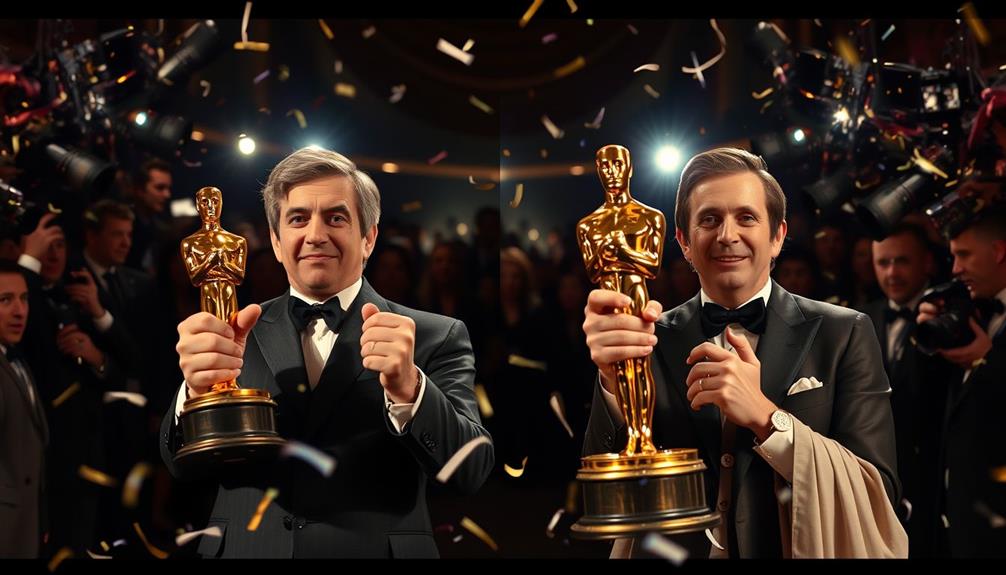
Throughout Oscar history, ties and unusual voting outcomes have sparked lively debates among film enthusiasts and critics alike, often revealing the complexities of the voting process and its influence on public perception.
These moments not only challenge the integrity of the Academy's voting decisions but also create lasting controversies, reminiscent of how narcissism can impact relationships.
Here are three notable instances that stand out:
- First Tie in Oscar History: In 1969, Barbra Streisand for "Funny Girl" and Katharine Hepburn for "Guess Who's Coming to Dinner" both won the Best Actress award, marking a significant moment in Oscar history.
- Marisa Tomei's Win: In 1992, Marisa Tomei's victory for Best Supporting Actress in "My Cousin Vinny" raised eyebrows when some speculated that presenter Jack Palance may have mistakenly announced her name, leading to questions about the legitimacy of her win.
- Best Picture Shocker: The 1999 awards saw "Shakespeare in Love" defeat the heavily favored "Saving Private Ryan" for Best Picture, creating a heated debate about the Academy's voting outcomes.
These instances remind us that ties and unusual voting outcomes can lead to controversial discussions regarding who deserves to win and what influences the Academy's decisions.
Backlash Against Awards Decisions
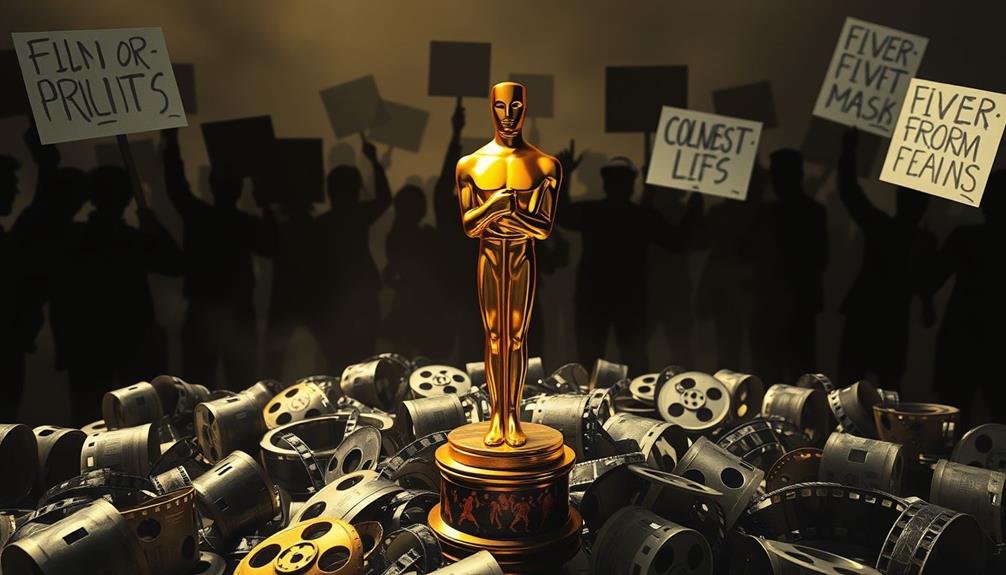
Oscar winners don't just make headlines; they often ignite passionate discussions about the Academy's choices. The backlash against certain decisions has become a hallmark of Oscars history.
Take the 2006 Best Picture win for "Crash," for instance. Critics claimed homophobic voting influences led to its victory over "Brokeback Mountain," labeling it one of the worst winners ever. Similarly, "Green Book" winning in 2019 sparked heated debates about historical inaccuracies and representation, prompting widespread criticism of the Academy's voting process. These instances highlight how public sentiment can align with concerns about AI in Cybersecurity, as both involve scrutinizing decision-making processes and biases.
Another controversial moment occurred in 1999 when "Shakespeare in Love" upset "Saving Private Ryan." This surprise win left fans and critics alike disappointed, questioning the Academy's criteria for greatness.
Additionally, Kevin Costner's win for "Dances With Wolves" in 1991 over Martin Scorsese's "Goodfellas" prompted discussions about the Academy's preference for traditional narratives over groundbreaking cinema.
Historical and Cultural Significance
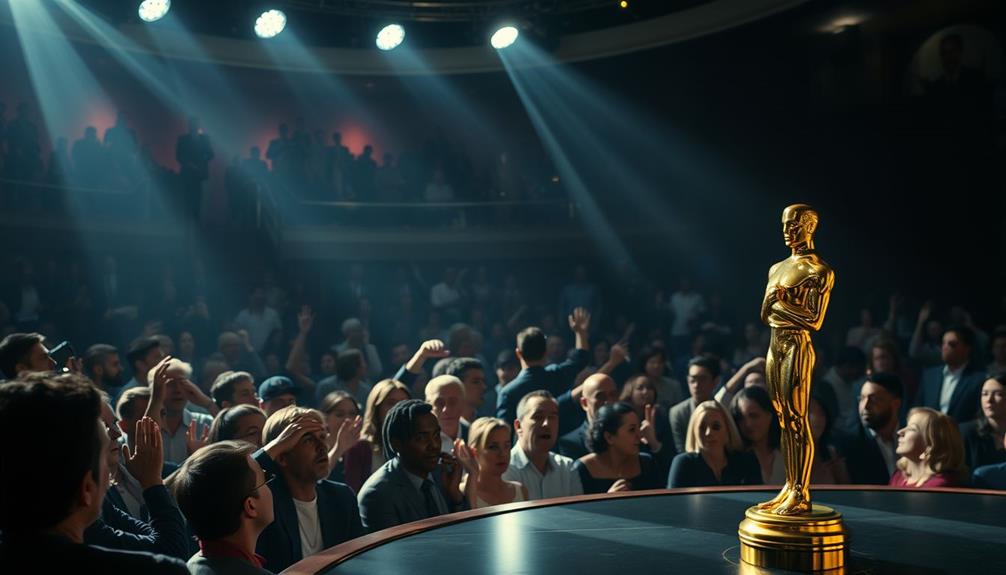
The Oscars aren't just about celebrating films; they reflect deeper societal issues and shifts in culture.
You can see this in moments like Hattie McDaniel's groundbreaking win, which shed light on racial discrimination, or Marlon Brando's protest that sparked conversations about representation.
These events show how the Academy has both influenced and mirrored the ongoing fight for equality and recognition in Hollywood.
Racial Discrimination in Hollywood
While Hollywood has often celebrated its cinematic achievements, the underlying currents of racial discrimination have considerably shaped its history and culture. The struggle for diversity and representation at the Academy Awards reveals deep-rooted issues within the industry.
Here are three pivotal moments that highlight this ongoing issue:
- Hattie McDaniel's Oscar Win: In 1940, Hattie McDaniel became the first Black person to win an Oscar for her role in "Gone With the Wind." However, she faced racial discrimination, being segregated and seated apart from her white peers during the ceremony.
- The #OscarsSoWhite Movement: Launched in 2015, the #OscarsSoWhite campaign called attention to the all-white nominations for acting awards, emphasizing systemic exclusion and urging the Academy to embrace greater diversity.
- Marlon Brando and Sacheen Littlefeather: Brando's 1973 Best Actor win was overshadowed when he sent Littlefeather to decline the award, protesting the portrayal of Native Americans in film and advocating for their rights.
These moments underscore the persistent underrepresentation of marginalized communities in Hollywood and the need for change in the Academy Awards.
Activism Through Acceptance Speeches
Acceptance speeches at the Oscars have evolved into powerful platforms for activism, shedding light on pressing social issues and injustices. From Marlon Brando's groundbreaking refusal of his Oscar in 1973, delivered through Sacheen Littlefeather, to Richard Gere's 1993 speech criticizing the Chinese government, these moments illustrate the impact of speaking out. Halle Berry's historic Best Actress win in 2002 emphasized representation, inspiring future generations.
Joaquin Phoenix's 2020 acceptance speech passionately addressed animal exploitation and social justice, reflecting a growing trend of activism in Hollywood. Frances McDormand's introduction of the "inclusion rider" in 2018 advocated for diversity and gender equality, marking a significant shift in the purpose of acceptance speeches.
Here's a summary of notable Oscar speeches that pushed for social change:
| Year | Activist | Key Message |
|---|---|---|
| 1973 | Marlon Brando/Sacheen Littlefeather | Treatment of Native Americans |
| 2002 | Halle Berry | Importance of representation |
| 2020 | Joaquin Phoenix | Animal rights and social justice |
These speeches not only entertain but also challenge the status quo, making the Oscars a venue for meaningful dialogue.
Historic Representation Milestones
Oscar history is marked by significant milestones in representation that reflect broader societal changes and cultural shifts. These moments not only highlight achievements but also expose ongoing challenges in Hollywood.
- Hattie McDaniel became the first African American to win an Academy Award in 1940 for her role in "Gone With the Wind," yet she faced racial discrimination, being seated separately from her peers.
- In 1973, Marlon Brando refused his Best Actor Oscar for "The Godfather," sending Sacheen Littlefeather to decline it in protest of Hollywood's portrayal of Native Americans, a pivotal moment in representation.
- The #OscarsSoWhite movement in 2015 revealed a stark lack of diversity, as all 20 acting nominations went to white actors, sparking calls for reform within the Academy.
In 2002, Halle Berry broke barriers as the first African American woman to win the Best Actress Oscar, underscoring the importance of representation for women of color.
The Academy's 2022 apology to Littlefeather also marked a step towards acknowledging past mistreatment, highlighting the ongoing need for diversity and sensitivity in the film industry.
Conclusion
In the ever-evolving landscape of the Oscars, controversy's become as much a part of the show as the golden statuettes themselves. From bold political statements to surprising winners, these moments shape how we view cinema and society. Just like a vintage film projector illuminating a dark room, each incident reveals deeper truths about our culture. As the Academy continues to evolve, you'll want to keep an eye out for what sparks the next big debate in Hollywood.

